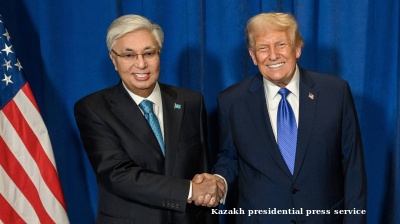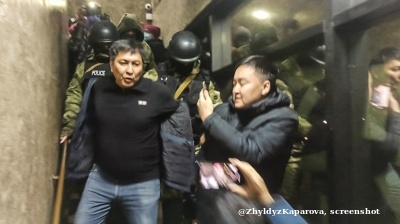The window for public comment will on September 28 close on a revived effort to amend Kyrgyzstan’s legal framework covering religious activity. Officials contend the changes are needed to combat extremism and ensure public safety. Critics, however, say the changes would give authorities excessive control over the spiritual life of citizens.
President Sadyr Japarov’s administration first pushed for an overhaul Kyrgyzstan’s religion laws in 2023 but that initial effort stalled. The government renewed its regulatory campaign in late August, introducing two bills that would replace legislation enacted in 2008. After the close of the public comment period, the national parliament, the Zhogorku Kenesh, is expected to take up the bills. If adopted, the new measures could go into effect in early 2025.
The bills contain provisions promoting the strict separation of church and state, retaining Kyrgyzstan’s basic character as a secular society. Under the bills, political parties or associations with an explicitly religious identity or purpose would be prohibited. Politicians would additionally be barred from invoking religious rhetoric in public discussions about policy matters. In addition, clerics and other religious figures would be banned from running for or holding public office, and from campaigning on behalf of candidates. Meanwhile, strict procedures would be implemented to monitor members of the state bureaucracy to ensure their private beliefs aren’t influencing their public responsibilities.
At the same time, the bills would grant wide powers to officials to regulate religious activity and public expressions of faith. Among the more stringent requirements, all religious institutions operating in Kyrgyzstan would need to obtain state registration and would be required to re-register every five years. Engaging in religious activity without official sanction would be a criminal offence. The bills would additionally tighten registration requirements, for example increasing the threshold for numbers of founders required to gain registration for a religious community.
The proposed changes would also vastly increase state oversight of religious education. In predominantly Muslim Kyrgyzstan, the new laws would expand official control over the religious instruction taught in the country’s madrasas. Presently, any officially recognised religious institution is permitted to operate a religious school. Under the proposed new framework, madrasas would require separate operating permits issued by the State Commission on Religious Affairs. In addition, the changes would heighten qualification requirements for religious teachers. And anyone seeking religious training abroad would be required to obtain permission from the state commission.
The government likewise seeks to tighten control over the discussion of religious matters on the internet. The bills would ban the publication of materials deemed offensive to believers or which promote the superiority of one religious belief over another. Other provisions could potentially punish women who wear religious attire, such as a niqab or burqa, as well as ban door-to-door proselytising.
Observers say Japarov, along with the head of the State Committee for National Security, Kamchybek Tashiev, have designed the proposed changes with the twin aims of increasing state control over religious affairs and restricting the impact of foreign spiritual influences, in particular ultra-conservative Islamic practices frequently associated with militant activity.
Tashiev has publicly expressed concern about proselytising and educational activities that strive to “Arabize” Kyrgyz citizens and “turn religion in a different direction.” In recent weeks, state-supportive media have published content designed to build public support for the pending changes.
Non-Muslim religious communities in Kyrgyzstan could end up being hurt the most by the changes. Representatives from various religious communities in Kyrgyzstan reported not being consulted about the content of the bills, with some saying they had not even seen the text of the proposed legislation, according to a report published by Forum 18, a news outlet focusing on religious freedom issues. They did not expect that any input they gave would be taken into account by authorities.
“I am afraid that if these changes are adopted, and if the authorities continue their past strategies, many Churches will be closed down,” Forum 18 quoted a member of a Protestant religious community as saying.
This article first appeared on Eurasianet here.
Features

What Central Asia wants out of the upcoming Washington summit
Clarity on critical minerals and a lot else.

Global leaders gather in Gyeongju to shape APEC cooperation
Global leaders are arriving in Gyeongju, the cultural hub of North Gyeongsang Province, as South Korea hosts the Asia Pacific Economic Cooperation summit. Delegates from 21 member economies are expected to discuss trade, technology and security.

Project Matador marks new South Korea-US nuclear collaboration
Fermi America, a private energy developer in the United States, is moving ahead with what could become one of the most significant privately financed clean energy projects globally.



